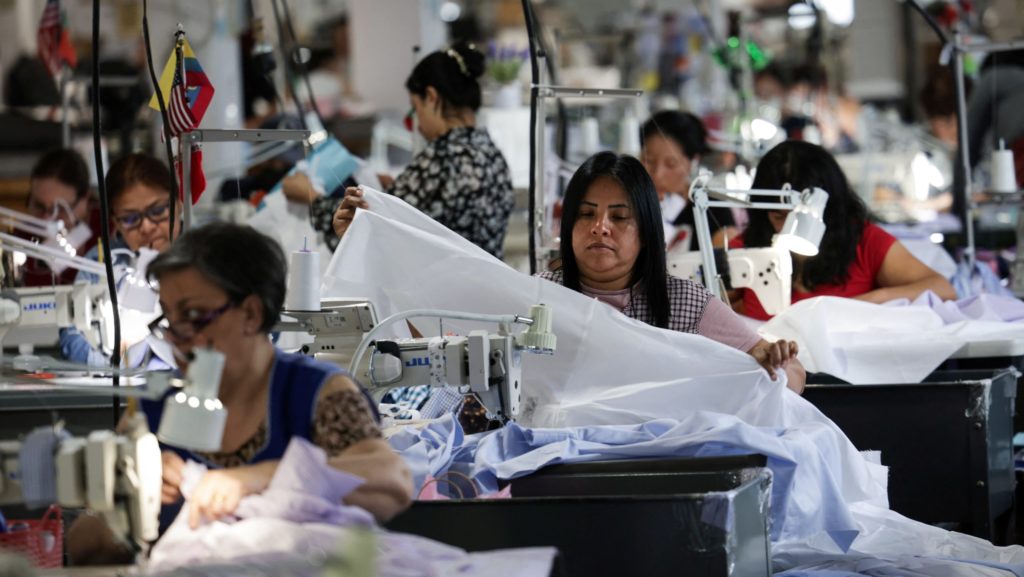In a world economy rocked by the whiplash of American trade tariffs that has spared few countries, the U.S. Conference of Catholic Bishops and Jubilee USA Network, an interfaith development group, have a proposition for President Donald J. Trump: Forgive some debts.
In a joint letter dated April 8, the two organizations wrote Trump, encouraging him to build on global debt relief efforts from his first term.
According to the United Nations, the external debt -- money owed to foreign creditors -- of developing countries has quadrupled in two decades to a record $11.4 trillion in 2023, equivalent to 99% of their export earnings.
USCCB, chair of the USCCB's Committee on International Justice and Peace, and Eric LeCompte, Jubilee USA Network's executive director, in the joint letter.
"These policies, which cost us little, contribute significantly to the stability of our trading partners, reduce food and fuel prices here at home, and support American jobs and exports," they said.
The timing of the joint letter is not coincidental: The erasure of debt is an ancient social justice principle still encouraged during the current Jubilee Year, and Pope Francis has addressed the issue on numerous occasions in anticipation of it.
Last December -- prior to the Christmas Eve inauguration of the 2025 Jubilee Year -- Pope Francis urged wealthy nations and institutions to reduce or outright cancel the debt of the world's poorest countries, declaring that many "are in no condition to repay the amount they owe."
In addition, the pope called for new financial structures, "lest this prove merely an isolated act of charity that simply reboots the vicious cycle of financing and indebtedness."
Less than two weeks later, the Vatican -- partnering with interreligious and development groups -- launched debt relief campaigns in 160 countries.
Pope Francis' message and actions echoed those of St. John Paul II at the start of the last Jubilee Year in 2000, when the beloved Polish pontiff warned that debt "threatens the future of many nations."
In that Jubilee era, faith groups formed a collective campaign that achieved $130 billion in debt relief for developing countries, supporting education, health care and social services.
"On average, strategically important developing nations currently spend more than 40% of their revenue on debt payments. Nearly 800 million people worldwide face hunger and almost 700 million live in extreme poverty," the letter to Trump stated. "The reduction of foreign assistance from developed to developing countries over the past six years underscores the urgency of our country's efforts to implement meaningful debt relief policies."
In January, Trump ordered a near-total freeze on all U.S. foreign aid. In March -- after a review of U.S. Agency for International Development operations -- it was announced 83% of USAID programs would be cancelled.
The letter further highlighted Pope Francis' proposal for a kind of global bankruptcy process to ensure stability and equity, while suggesting a significant increase in lending volume by multilateral development banks.
Appealing to policy as well as charity, the letter repeatedly underscored the strategic importance of debt reduction and the role of the U.S.
"Simply stated," Bishop Zaidan and LeCompte's letter concluded, "the world needs strong American leadership on debt relief and financial architecture reform."
Several major financial gatherings -- the International Monetary Fund, the G20 in South Africa, and G7 in Canada -- are upcoming, with the U.S. hosting the G20 in 2026.
Other Catholic organizations concerned with debt reacted to the USCCB and Jubilee USA Network missive.
"Nations burdened by oppressive debt cannot invest in education, healthcare, agriculture, and a future for their youth. Many developing countries are already in crisis because of massive debt burdens," Gina Castillo, senior research and policy advisor at Catholic Relief Services, the overseas humanitarian relief agency of the Catholic Church in the U.S., told OSV News.
"Debt relief and addressing why countries get into debt restores hope and opens doors to opportunity," Castillo said.
Susan Gunn, director of the Maryknoll Office for Global Concerns, agreed.
"As the U.S. bishops said in their letter to the president, the United States has the opportunity to make real change that would make the world a better place not only for people on the other side of the world but right here at home," Gunn told OSV News. "We are all connected and we all would benefit from a healthier, more life-giving global economy."

